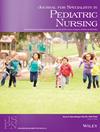Psychological differences between toilet trained and non-toilet trained 4-year-old children
Abstract
Objective
Late to complete toilet training has been associated with many psychological factors including behavior and mood problems. Unfortunately, the majority of the research is specific to children with elimination disorders or children identified as incontinent after the age of 7 years. The current study addressed gaps in the literature by comparing the psychological functioning of children not toilet trained by their 4-year-old well child care visit with their toilet trained peers.
Design and Methods
Parent reports of internalizing and externalizing behavior using the Child Behavior Checklist (CBCL) were compared across groups, non-toilet trained and toilet trained, for 150 children recruited during their 4-year-old well child health care visit. Independent samples t tests of group means and χ2 analyses were performed on all CBCL scales.
Results
Results found no clinically or statistically significant differences between groups on parents' reports of internalizing and externalizing behavior. The current study provides no evidence that delays in successfully completing toilet training by 4 years of age were related to psychological problems for this sample of children.
Practice Implications
Nursing professionals in primary care settings are positioned to provide anticipatory guidance to parents of children not yet toilet trained. Findings from the current study offer evidence that delays in toilet training might not be related to psychopathology, and these children are not likely to require intervention outside the pediatric setting and could be effectively managed by primary care health providers employing evidence-based toilet training protocols.

 求助内容:
求助内容: 应助结果提醒方式:
应助结果提醒方式:


